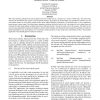144
click to vote
ACL
2012
13 years 4 months ago
2012
Unsupervised word representations are very useful in NLP tasks both as inputs to learning algorithms and as extra word features in NLP systems. However, most of these models are b...
130
click to vote
ACL
2011
14 years 5 months ago
2011
Unsupervised vector-based approaches to semantics can model rich lexical meanings, but they largely fail to capture sentiment information that is central to many word meanings and...
117
click to vote
ACL
2010
15 years 3 days ago
2010
We challenge the NLP community to participate in a large-scale, distributed effort to design and build resources for developing and evaluating solutions to new and existing NLP ta...
121
click to vote
CORR
2004
Springer
15 years 1 months ago
2004
Springer
Lexical resources such as WordNet and the EDR electronic dictionary (EDR) have been used in several NLP tasks. Probably partly due to the fact that the EDR is not freely available...
112
click to vote
NAACL
2004
15 years 3 months ago
2004
Previous work demonstrated that web counts can be used to approximate bigram frequencies, and thus should be useful for a wide variety of NLP tasks. So far, only two generation ta...
114
click to vote
ACL
2004
15 years 3 months ago
2004
Convolution kernels, such as sequence and tree kernels, are advantageous for both the concept and accuracy of many natural language processing (NLP) tasks. Experiments have, howev...
97
Voted
LREC
2008
15 years 3 months ago
2008
Web count statistics gathered from search engines have been widely used as a resource in a variety of NLP tasks. For some tasks, however, the information they exploit is not fine-...
124
click to vote
LREC
2008
15 years 3 months ago
2008
In recent years, language resources acquired from the Web are released, and these data improve the performance of applications in several NLP tasks. Although the language resource...

